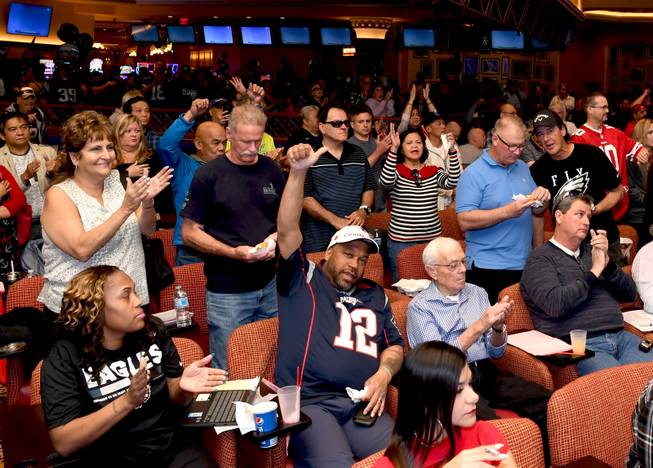
Glenn Pinkerton/Las Vegas News Bureau
Fans flock to the South Point Hotel & Casino in Las Vegas for the big game. In this photo fans cheer for the Patriots during the big game in the South Point Sportsbook. Sunday, February 4, 2018. CREDIT: Glenn Pinkerton/Las Vegas News Bureau
Tuesday, May 15, 2018 | 2 a.m.
First, many expected the decision to come in January. When that didn’t happen, focus shifted to March. Then April.
A protracted delay is nothing new when it comes to a Supreme Court ruling, as the nine justices operate painstakingly on their own timetable, but it felt particularly appropriate with the sports betting case lingering since last June.
For years, if not decades, those in the gambling industry denounced the Professional and Amateur Sports Protection Act, a law passed in 1992 that kept full-fledged sports betting outside of every state except Nevada, as unconstitutional.
They finally found their vindication on Monday, when the Supreme Court repealed PASPA by a 6-3 vote to allow states to make their own decision on the legality of sports betting. New Jersey, which began the push to legalize six years ago, could begin taking bets as soon as two weeks from now with several states expected to follow suit in the ensuing months and years.
In the end, it’s all going to be well worth the wait. Despite some misconceptions, this isn’t bad news for any of the involved parties.
Not for the bettors, many of whom will now have a safer way to gamble into a regulated market instead of wagering an annual $150 billion illegally, according to estimates from the American Gaming Association. Not for the sports leagues, which will only continue to benefit from sports betting’s popularity even if they don’t get a cut through the NBA’s absurd, proposed, “1 percent integrity fee.”
And certainly not for Las Vegas, which will remain the sports gambling capital of the world regardless.
“In the long run I expect this to be a victory for Las Vegas,” said Geoff Freeman, president of the American Gaming Association. “As this market moves to the legal environment, as gaming goes more mainstream, as we’ve seen in the past, Las Vegas only strengthens.”
No matter how many sports books spring up in casinos and race tracks across the country, nowhere is going to offer the aura and amenities of the Strip and surrounding properties. Fans, for the most part, aren’t uninterested in traveling to go to major league sporting events because their town has a minor league franchise.
The Westgate Las Vegas Superbook is always going to be akin to something like Yankee Stadium in sports betting. Somewhere like the Mirage is Madison Square Garden.
Las Vegas will stay home to the most hallowed sports betting venues, and they could become an even bigger draw if sports betting volume continues to increase.
Shops across the rest of the country will be glorified satellite locations — especially since many of them figure to be run by local companies. Companies like MGM Resorts International, Caesars Entertainment, William Hill U.S. and CG Technology have all the infrastructure in place to expand their operations.
In its annual Analyst and Investor day last week, MGM Resorts shared a market revenue potential projection of $5 billion by 2024 if the sports betting ban was overturned. The numbers came from Eilers & Krejcik Gaming, a consulting firm focused on different assets of gaming including sports betting.
“We believe in the next two to three years, there will be 10-12 states that are ripe and ready to activate,” MGM Resorts CEO Jim Murren said last week. “We will be there. We will participate in it. We bring technology, we bring knowledge and frankly in this space we bring trust.”
Trust must be fostered in the wake of PASPA’s demise. For too many years, the leagues at least propagated a misguided sense of distrust of Nevada sports books.
That’s foolish when the two entities share the same basic aim: They both want to protect the integrity of games. Regulated sports books can have up to millions of dollars riding on the outcomes, so they’re every bit as invested as the bodies putting on the events.
There’s a reason why it was Las Vegas bookmakers whom alerted the NCAA to the infamous Arizona State basketball point-shaving scandal of 1994, as well as successfully watchdogging on several other occasions.
“There’s no need to reinvent the wheel,” Freeman said. “Nevada has a functioning market. You don’t see any type of integrity fee; you don’t see other restrictions that are in place. What you do see is a partnership between the leagues to protect the integrity of the game and the bet. You see a partnership to protect consumers and I’d like to see that partnership continue.”
It shouldn’t just continue, but also stabilize and thrive. The legalization of sports betting allows the opportunity to do it right for once and for all.
It’s exciting for everyone involved — and long overdue.
Case Keefer can be reached at 702-948-2790 or [email protected]. Follow Case on Twitter at twitter.com/casekeefer.


Join the Discussion:
Check this out for a full explanation of our conversion to the LiveFyre commenting system and instructions on how to sign up for an account.
Full comments policy